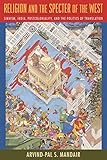Religion and the specter of the West :
Series: Insurrections. Published by : Columbia University Press, (New York :) Physical details: xviii, 516 p. ; 24 cm. ISBN:9780231147248 (cloth : alk. paper); 0231147244 (cloth : alk. paper); 9780231519809 (ebook); 023151980X (ebook).| Item type | Current library | Call number | Status | Date due | Barcode |
|---|---|---|---|---|---|
| Books | Oxford Centre for Hindu Studies Library | Available | OCHS11111058 |
Includes glossary.
Includes bibliographical references and index.
Introduction --- Part I. "Indian Religions" and Western Thought. 1. Mono-theo-lingualism: Religion, Language, and Subjectivity in Colonial North India -- 2. Hegel and the Comparative Imaginary of the West --- Part II. Theology as Cultural Translation. 3. Sikhism and the Politics of Religion-Making -- 4. Violence, Mysticism, and the Capture of Subjectivity --- Part III. Postcolonial Exits. 5. Ideologies of Sacred Sound -- 6. Decolonizing Postsecular Theory --- Epilogue.
Arguing that intellectual movements, such as deconstruction, postsecular theory, and political theology, have different implications for cultures and societies that live with the debilitating effects of past imperialisms, Arvind Mandair unsettles the politics of knowledge construction in which the category of "religion" continues to be central. Through a case study of Sikhism, he launches an extended critique of religion as a cultural universal. At the same time, he presents a portrait of how certain aspects of Sikh tradition were reinvented as "religion" during the late nineteenth and early twentieth centuries. India's imperial elite subtly recast Sikh tradition as a sui generis religion, which robbed its teachings of their political force. In turn, Sikhs began to define themselves as a "nation" and a "world religion" that was separate from, but parallel to, the rise of the Indian state and global Hinduism. Rather than investigate these processes in isolation from Europe, Mandair shifts the focus closer to the political history of ideas, thereby recovering part of Europe's repressed colonial memory.

